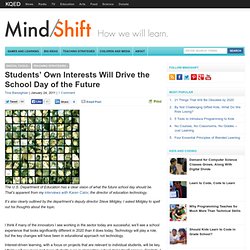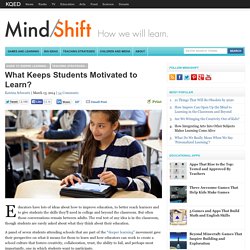

The Walking Dead Weapon That Will Save Us All. Remember that scene in The Walking Dead where the gang smear themselves with zombie guts to pass unnoticed through a herd of Walkers?

Well, scientist Raychelle Burks has invented a less messy way of slipping past: Death-scented perfume. What Do Emotions Have to Do with Learning? Thinkstock When parents and teachers consider how children learn, it’s usually the intellectual aspects of the activity they have in mind.

Sidney D’Mello would like to change that. The University of Notre Dame psychologist has been studying the role of feelings in learning for close to a decade, and he has concluded that complex learning is almost inevitably “an emotionally charged experience,” as he wrote in a paper published in the journal Learning and Instruction earlier this year. During the learning experiments described in his paper, he notes, the participating students reported being in a neutral state only about a quarter of the time. The rest of the time, they were were experiencing lots of feelings: surprise, delight, engagement, confusion, boredom, frustration.
Another counter-intuitive contention made by D’Mello is that even negative emotions can play a productive role in learning. Animated agents discussing scientific case studies. Related. Students’ Own Interests Will Drive the School Day of the Future. The U.S.

Department of Education has a clear vision of what the future school day should be. That’s apparent from my interviews with Karen Cator, the director of education technology. It’s also clearly outlined by the department’s deputy director Steve Midgley. I asked Midgley to spell out his thoughts about the topic. I think if many of the innovators I see working in the sector today are successful, we’ll see a school experience that looks significantly different in 2020 than it does today.
Interest-driven learning, with a focus on projects that are relevant to individual students, will be key. When you provide flexible opportunities for students to learn, every single one takes the opportunity, and sometimes in ways that you don’t expect. I grew up in a Montessori school that my parents founded, and a lot of the techniques employed in that school focused on independent learning.
And online learning will be totally ubiquitous in education by 2020. Related. What Keeps Students Motivated to Learn? Educators have lots of ideas about how to improve education, to better reach learners and to give students the skills they’ll need in college and beyond the classroom.

But often those conversations remain between adults. The real test of any idea is in the classroom, though students are rarely asked about what they think about their education. A panel of seven students attending schools that are part of the “deeper learning” movement gave their perspective on what it means for them to learn and how educators can work to create a school culture that fosters creativity, collaboration, trust, the ability to fail, and perhaps most importantly, one in which students want to participate. Project-based learning is the norm among these students, but they also have a lot of ideas about what makes a good project work. Students want projects to be integrated across subjects, not separated by discipline. “Treat students like adults. Related.